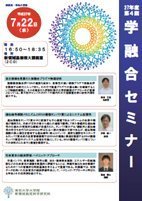AY2015 4th Gakuyugo Seminar
- Date&Time:
- Jul 22, 2015 16:50~18:35
- Venue:
- Large Lecture Room (2C0), New Frontier Science Bldg.

Research on fusion plasma physics with a view to self-sustained burning
Associate Professor Masaki Nishiura
With the start of the construction of the International Thermonuclear Reactor (ITER), we have entered the era of developing a burning plasma fusion reactor with high autonomy. In this context, it is important to understand the behavior of high-temperature plasmas from a physical point of view, and to take an engineering approach based on this understanding. We will introduce our research using the RT-1 at the Kashiwa campus of the University of Tokyo and other large devices in Japan and abroad as examples.

Genetic code decoding mechanism and system extensibility by tRNA mimetic proteins
Professor Koichi ItoThe entire atomic structure of the ribosome, the central apparatus that converts genetic information into protein molecules, has been elucidated, facilitating a visual understanding of the mechanism of the universal genetic code that life has acquired through the process of evolution since ancient times. A group of nucleic acid molecules called tRNAs mediate between the amino acid sequences of proteins and the genetic code, but the genetic code (termination codon), which indicates the termination site of the deciphering of genetic information, and the quality control mechanism of protein synthesis, which monitors abnormal translation, have been developed to mimic the function and structure of tRNAs. We will review the past and future research on tRNA mimetic proteins.

Economic Valuation of Social Capital: A Hedonic Approach
Lecturer Shota Fujishima
Quantitative evaluation of the value of social capital, such as transportation infrastructure, educational facilities, urban parks, flood control and coastal protection facilities, and energy supply facilities, is important in providing one objective criterion for building a sustainable society. In this lecture, I will introduce a method called the hedonic approach and its applications as an economic evaluation method for social capital using spatial data.
*The contents of this page were developed based on a machine translation.

